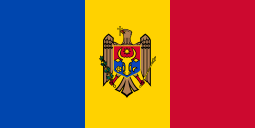Languages of Moldova
The state language of Moldova is Romanian which is the native language of 80.2% of the population; it is also spoken as a primary language by other ethnic minorities. Gagauz, Russian, and Ukrainian languages are granted official regional status in Gagauzia and/or Transnistria.
| Languages of Moldova | |
|---|---|
| Official | Romanian |
| Semi-official | Russian (interethnic)[1][2][3] |
| Minority | Ukrainian, Gagauz, Bulgarian |
| Foreign | Russian, French, English |
| Signed | Romanian Sign Language |
| Part of a series on the |
| Culture of Moldova |
|---|
 |
| History |
| People |
|
Cuisine |
| Festivals |
| Religion |
|
Art
|
| Literature |
|
Music and performing arts |
|
Media |
| Sport |
|
Monuments
|
|
Official language
The 1989 State language law of the former Moldavian Soviet Socialist Republic declared that Moldovan, written in the Latin script, was the sole state language, intending it to serve as a primary means of communication among all citizens of the republic. The law speaks of a common Moldovan-Romanian linguistic identity. Until 1989 Moldova used the Cyrillic alphabet for writing a language that was, by that time, no different from standard Bucharest Romanian; in part of Moldova, the separatist Pridnestrovian Moldavian Republic, the old script is still used in schools and on street signs. Even after shifting to the Latin alphabet, some Moldovan officials continue to insist that the designated "state language" is an east-Romance idiom somehow separate from Romanian.[4]
In 1991, the Declaration of Independence of Moldova named the official language as Romanian.[5]
At 9 September 1994, Academy of Sciences of Moldova confirms the reasoned scientific opinion of philologists from the Republic and abroad (approved by the decision of the Presidium of Academy of Science of Moldova of 9.09.94), according to which the correct name of the State language (official) of the Republic of Moldova is Romanian.[6]
The 1994 Constitution of Moldova said that "the national language of the Republic of Moldova is Moldovan, and its writing is based on the Latin alphabet."[7]
In December 2013, the Constitutional Court of Moldova ruled that the Declaration of Independence takes precedence over the Constitution, and the state language should be called "Romanian".[8][9][10][11][12]
Most linguists consider literary Romanian and Moldovan to be identical, with the glottonym "Moldovan" used in certain political contexts.[13] In 2003, the Communist government of Moldova adopted a political resolution on "National Political Conception," stating that one of its priorities was preservation of the Moldovan language. This was a continuation of Soviet-inflected political emphasis.
Since the Declaration of Independence in 1991, schools refer to this language as "Romanian" when teaching it or referring to it.[14]
In the 2004 census, 2,564,542 people (75.8% of the population of the country) declared their native language as "Moldovan" or "Romanian"; 2,495,977 (73.8%) speak it as first language in daily use. Apart from being the first language of use for 94.5% of ethnic Moldovans and 97.6% of ethnic Romanians, the language is also spoken as primary by 5.8% of ethnic Russians, 7.7% of ethnic Ukrainians, 2.3% of ethnic Gagauz, 8.7% of ethnic Bulgarians, and 14.4% of other ethnic minorities.
The 2014 census reported an estimated 2,998,235 people (without Transnistria), out of which 2,804,801 were actually covered by the census. Among them, 2,068,068 or 73.7% declared themselves Moldovans and 192,800 or 6.9% Romanians. .[15] Some organisations like the Liberal party of Moldova have criticised the census results, claiming Romanians comprise 85% of the population and that census officials have pressured respondents to declare themselves Moldovans instead of Romanians and have purposefully failed to cover urban respondents who are more likely to declared themselves Romanians as opposed to Moldovans [16]
According to the 2014 census, 2,720,377 answered to the question on "language usually used for communication". 2,138,964 people or 78.63% of the inhabitants of Moldova (proper) have Moldovan/Romanian as first language, of which 1,486,570 (53%) declared it Moldovan and 652,394 (23.3%) declared it Romanian.[17]
However, in Chisinau, the proportion of people who declared Romanian as opposed to Moldovan is larger - 43.3% vs 33%.[18]
Interethnic language
Russian
Russian is provided with the status of a "language of inter-ethnic communication" as with many post-soviet countries, and since Soviet times remains widely used on many levels of the society and the state. According to the above-mentioned National Political Conception, Russian-Romanian bilingualism is characteristic for Moldova.[19]
Russian was granted official status in Gagauzia, a region in the south of the country inhabited mostly by ethnic Gagauz, and in the breakaway region of Transnistria in the east of the country.
263,523 people or 9.4% have Russian as native language and some 94,133 people or 14.1% identified Russian as language of daily use. It is the first language for 93.2% of ethnic Russians, and a primary language for 4.9% of Moldovans, 50.0% of Ukrainians, 27.4% of Gagauz, 35.4% of Bulgarians, and 54.1% of other ethnic minorities.
Official minority languages
In localities with significant minority populations, other languages are granted official status alongside the state language.
Gagauz
Gagauz is an official minority language in Gagauzia, and has significant regional speaker population. 114,532 people or 4.1% identified Gagauz as their native language, but only 74.167 or 2.6% speak it as a first language.
Ukrainian
Ukrainian has co-official status in the breakaway region of Transnistria. In the main part of the country, 186,394 people declared it native, and (of these) 107,252 or 3.8% speak it as a first language.
Foreign languages
While since the 1990s most Moldovans learn English as their first foreign language in schools, few speak it at a sufficiently advanced level to be able to communicate and understand it freely. Sometimes French, Italian, or Spanish are taught first. These languages are often used by Moldovan expats and working migrants in other countries, including France, Italy, Ireland, Spain, and the United Kingdom. Usually the migrants learn the new languages after arriving in a new country. The expatriates and working migrants in Portugal, Greece, Turkey, Cyprus, and Germany have learned those countries' respective languages. Speakers of Portuguese, Greek, Turkish, and German live in Moldova.
Moldovans of older and middle generations are generally bilingual in the Romanian language and Russian, due to the long influence of and trade with the Soviet Union. Many Moldovan expatriates and migrant workers live and work in Russia. Many of the younger generation in Moldova, however, may not know this language well enough to be able to communicate in writing or to have a sophisticated conversation. Children study Russian one hour per week in school. There are more TV channels available to watch in Russian than in Romanian.
References
- "Игорь Додон // Русский язык должен вернуться в Молдову". Deschide. Deschide. Retrieved 18 August 2017.
- "Додон готов изменить статус русского языка в Молдавии в случае воссоединения с Приднестровьем". Rosbalt. Rosbalt. Retrieved 18 August 2017.
- "Русский союз Латвии будет сотрудничать с партией Социалистов Молдовы". Rusojuz. Rusojuz. Retrieved 18 August 2017.
- "147. The Politics of Language In Romania and Moldova", Wilson Center, 7 July 2011, retrieved 19 February 2019
- (in Romanian)Declaration of Independence of the Republic of Moldova
- http://limbaromana.md/index.php?go=articole&printversion=1&n=2482
- "The Constitution of the Republic of Moldova: Title I: General Principles, Article 13: The National Language, Use of Other Languages". Parliament of the Republic of Moldova. Archived from the original on 1 May 2008.
- Moldovan court rules official language is 'Romanian,' replacing Soviet-flavored 'Moldovan' at foxnews.com
- https://www.rferl.org/a/moldova-romanian-constitutional-court-moldovan/28826605.html Moldova's Top Court Endorses Proposal To Switch Official Language To 'Romanian' In Constitution. 31 October 2017 rferl.org
- https://www.loc.gov/law/foreign-news/article/moldova-romanian-recognized-as-the-official-language/
- http://www.moldova.org/en/court-ruled-romanian-as-moldovas-official-language-240511-eng/
- http://www.constcourt.md/download.php?file=cHVibGljL2NjZG9jL2hvdGFyaXJpL2VuLUp1ZGdtZW50MzYyMDEzZW5nY2MzOWYucGRm
- "Marian Lupu: Româna şi moldoveneasca sunt aceeaşi limbă" [Marian Lupu: Romanian and Moldovan are the same language] (in Romanian). Realitatea.net. 27 May 2008. Archived from the original on 11 May 2011. Retrieved 7 October 2009.
- "Ministerul Educației al Republicii Moldova - Curricula Națională - Planul-Cadru pentru învățamîntul primar, gimnazial și liceal anul de studii 2012-2013" [Ministry of Education of the Republic of Moldova - National Curriculum - Framework Plan for Primary and Secondary Education for study year 2012-2013] (PDF) (in Romanian). Government of Moldova, Ministry of Education. 2012. Archived from the original (PDF) on 12 December 2013. Retrieved 6 February 2013.
- Statistică, Biroul Naţional de. "Recensămîntul populației și al locuințelor 2014". Statistica.md. Retrieved 2 August 2017.
- Partidul Liberal despre datele Recensamantului din 2014, prezentate abia astazi, in 2017: "Sunt viciate si nu reflecta realitatea din Republica Moldova"
- Rezultatele Recensămîntului Populației și al Locuințelor 2014
- Rezultatele Recensămîntului Populației și al Locuințelor 2014
- "Lege privind aprobarea Concepţiei politicii naţionale a Republicii Moldova, Nr.546-XV" [Law on the approval of the Concept of National Politics of the Republic of Moldova, No. 546-XV]. Parliament of the Republic of Moldova (in Romanian). Archived from the original (DOC) on 25 February 2009.
Limba rusă care, în conformitate cu legislația în vigoare, are statutul de limbă de comunicare interetnică se aplică și ea în diverse domenii ale vieții statului și societății. Pentru Moldova este characteristic bilingvismul româno-rus. În actualele condiţii, este necesar să se creeze posibilități reale pentru ca bilingvismul ruso-românesc să devină realitate. [TRANS] The Russian language which, according to the legislation in force, has the status of a language of inter-ethnic communication, applies also in various spheres of life of the state and society. Romanian-Russian bilingualism is characteristic for Moldova. Under the current conditions, it is necessary to create real possibilities for Russian-Romanian bilingualism to become reality.
